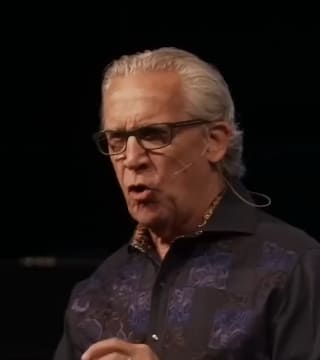Bill Johnson - Hope Brings Perspective to Sacrifice (07/28/2025)
You make sacrifices because you have something more valuable and pleasurable at the end of the sacrifice, and what hope does is keep the long-term situation in view. I’ve been looking forward to being with you because I wanted to talk to you about hope and how to take responsibility for the level of hope that lives in your own life. I’ve been learning to cook—yes, I have—and nothing extreme yet, but this last year or so I’ve been exploring. Just to let you know, on Friday I cooked sea bass with asparagus. I have seafood; I’m telling you it wasn’t red meat. Occasionally, I like to explore the vegetable world, such as asparagus, mushrooms, and some of the tiny little potatoes we grow in our garden, all cooked in duck fat, which is just the best way to cook! Can I hear an amen?
A huge salad with Parmesan cheese that I actually had sent over from Italy—it’s the proper kind—grated over the salad with olive oil and balsamic glaze. It was tremendous. Okay, you can go now. Oh, but I also took supplements. I take supplements to help fill in weaknesses in the American diet. The encouragement that you receive from other people, I guess you can live by it if you want to, but it’s not the meal—it’s just supplements. The meal is what you find on your own to feed your soul with, and we each have the responsibility to maintain the level of hope in our own lives. Many people live in a place of actual famine, needing someone else to bring them good news when God has given you actual legal access to an unlimited resource of refreshing and good news. He oftentimes hides what we need the most in the most offensive situation or circumstance.
In Proverbs 25, verse 2, it says, «It’s the glory of God to conceal a matter; it’s the glory of kings to search out a matter.» So, it’s the glory of God to conceal a matter; He hides things for us, not from us. My oldest grandson, Judah, works for me at my house and helps take care of things that I either don’t want to do or don’t have the time to do—most of it’s the first one; I don’t want to do it. I pay him well, and I think it was last week or the week before last that he found an Easter egg that had been there for probably two years. If you’re thinking hard-boiled egg, no—we put money in plastic eggs. I have one grandson who, when he was younger, we had hard-boiled eggs and money eggs. He would pick up an egg, shake it; if it rattled, he’d put it in his basket; if it didn’t rattle, it was hard-boiled, and he’d throw it back in the bush.
Thank you! He was a cash-only kid; it just killed him! But my grandson Judah actually found an egg that we had put there with cash in it, probably two years ago. God hides things for us. Then it goes on to say it’s the glory of kings—it’s the glory of people who know who they are and what they have legal access to and responsibility for. Think of it this way: there is a treasure hidden within reach that you have a responsibility to find because discovering that treasure will affect multiple generations. We’re not just talking about personal encouragement for yourself—that’s huge—but it’s not just personal pleasure or personal success; it’s the responsibility of creating a momentum of being a generation that hopes in God in all situations.
I have a responsibility to find, to apprehend, to lay hold of what God has put within reach. I remind you that’s how He described the kingdom of God. The kingdom is the realm of His dominion, so everything that exists in heaven that He wants to be released—if you will—on Earth as it is in heaven is in that realm called the kingdom. He said the kingdom is at hand; it’s within reach; it’s here, it’s now, and it’s obtainable. Unfortunately, many choose to live with the theology of a kingdom that is present but never learn how to find the treasures that have been hidden. The enemy works hard to keep us distracted through anxiety and fear—all that family of bad decisions—to keep us anxious so that we lose sight of and lose awareness of the solutions that God has for us.
The enemy works to make us anxious so that the problems we face appear bigger than the solutions we carry. God intends to work the impossible through a yielded people. What hope does is position me for surrender, while hopelessness removes from my awareness the beauty of sacrifice. Hopelessness robs me of an awareness of why to obey, why to sacrifice, why to pay a price. Let’s make it simple: if, say, you and your family were going to take a special vacation next year, you’ve got 12 months to save up for it, so you’ve decided to, I don’t know, cancel the movie channel, not eat out for six months or whatever.
You make sacrifices because you have something more valuable and pleasurable at the end of the sacrifice. What hope does is keep the long-term situation in view; it keeps perspective on the pain I experience right now. The self-denial that I have in this moment will be worth it because we’re going on this vacation. Does that make sense? What hopelessness does is rob me of the delight of obedience. I may still be locked into the discipline of obedience; I still may do all the right things externally, but because of hopelessness, my heart doesn’t get to feast on the joy of obedience.

